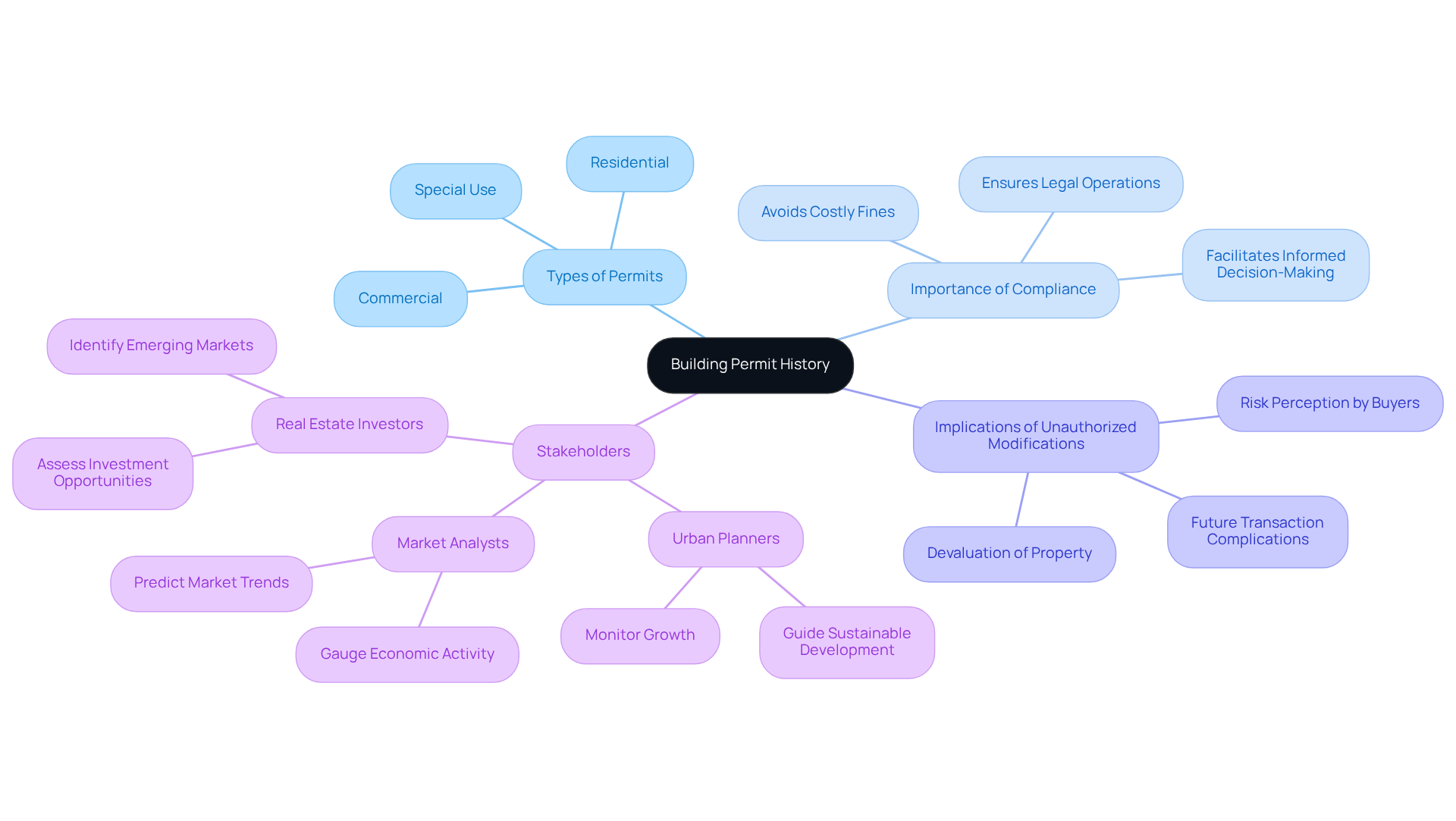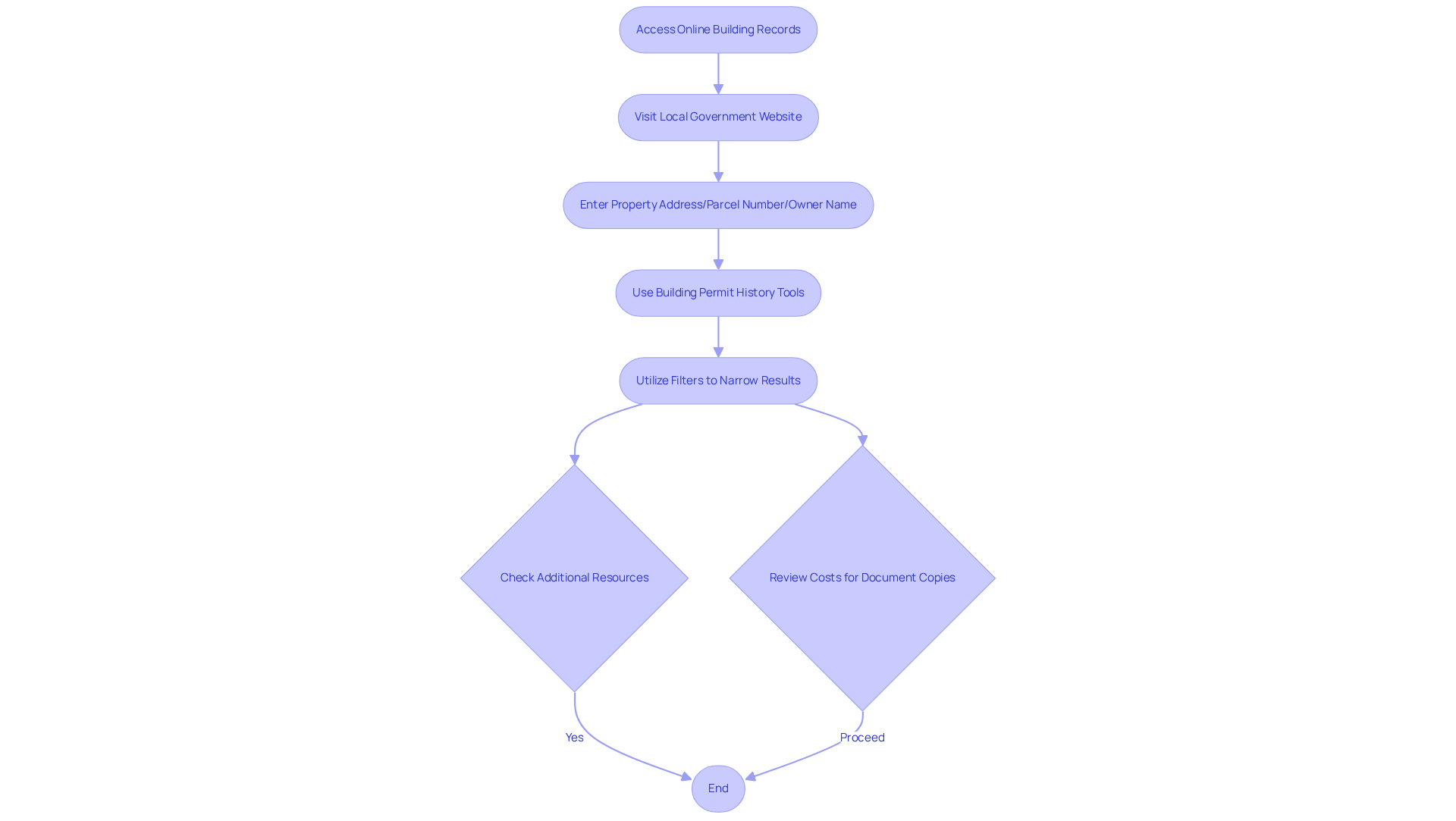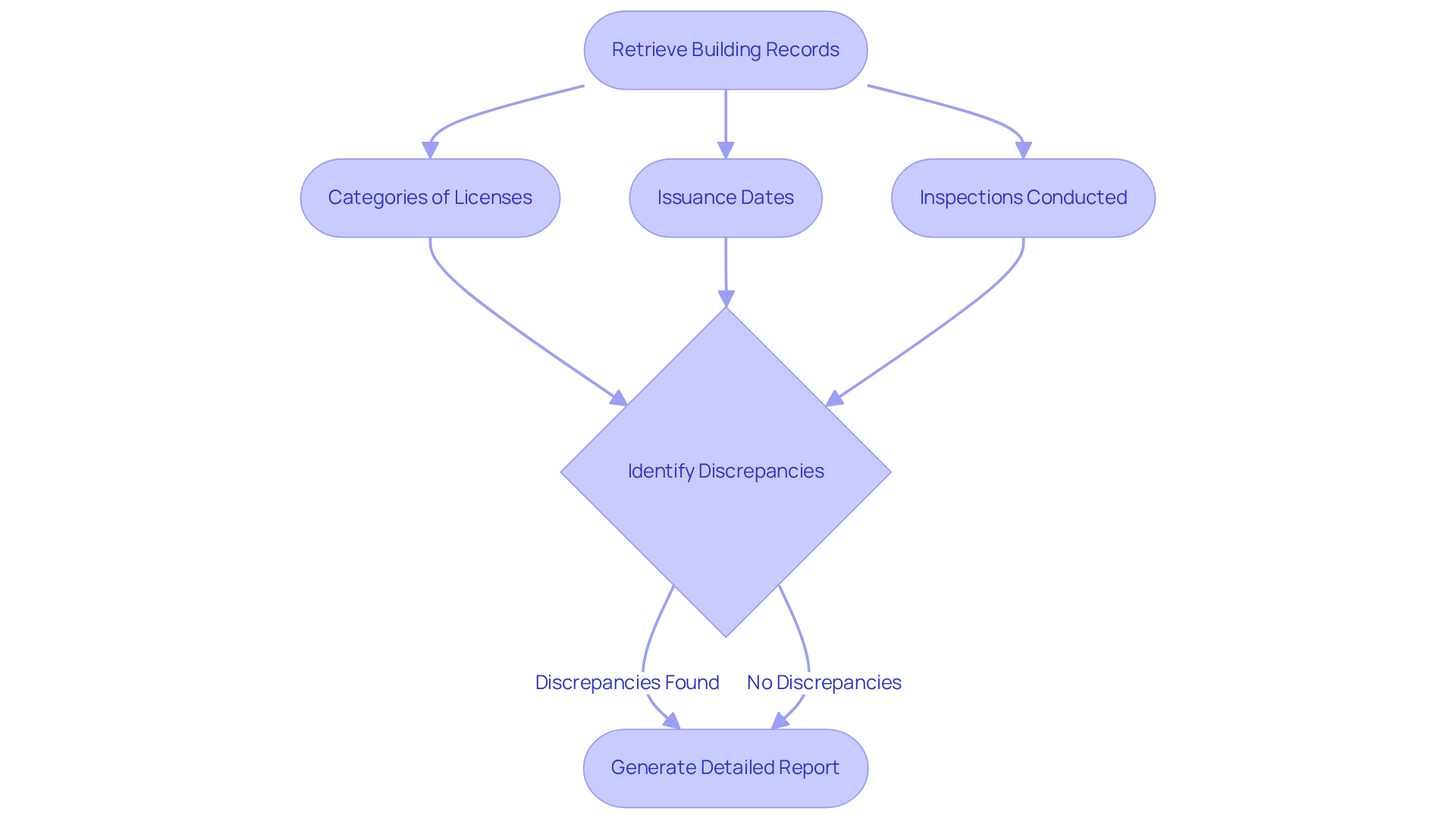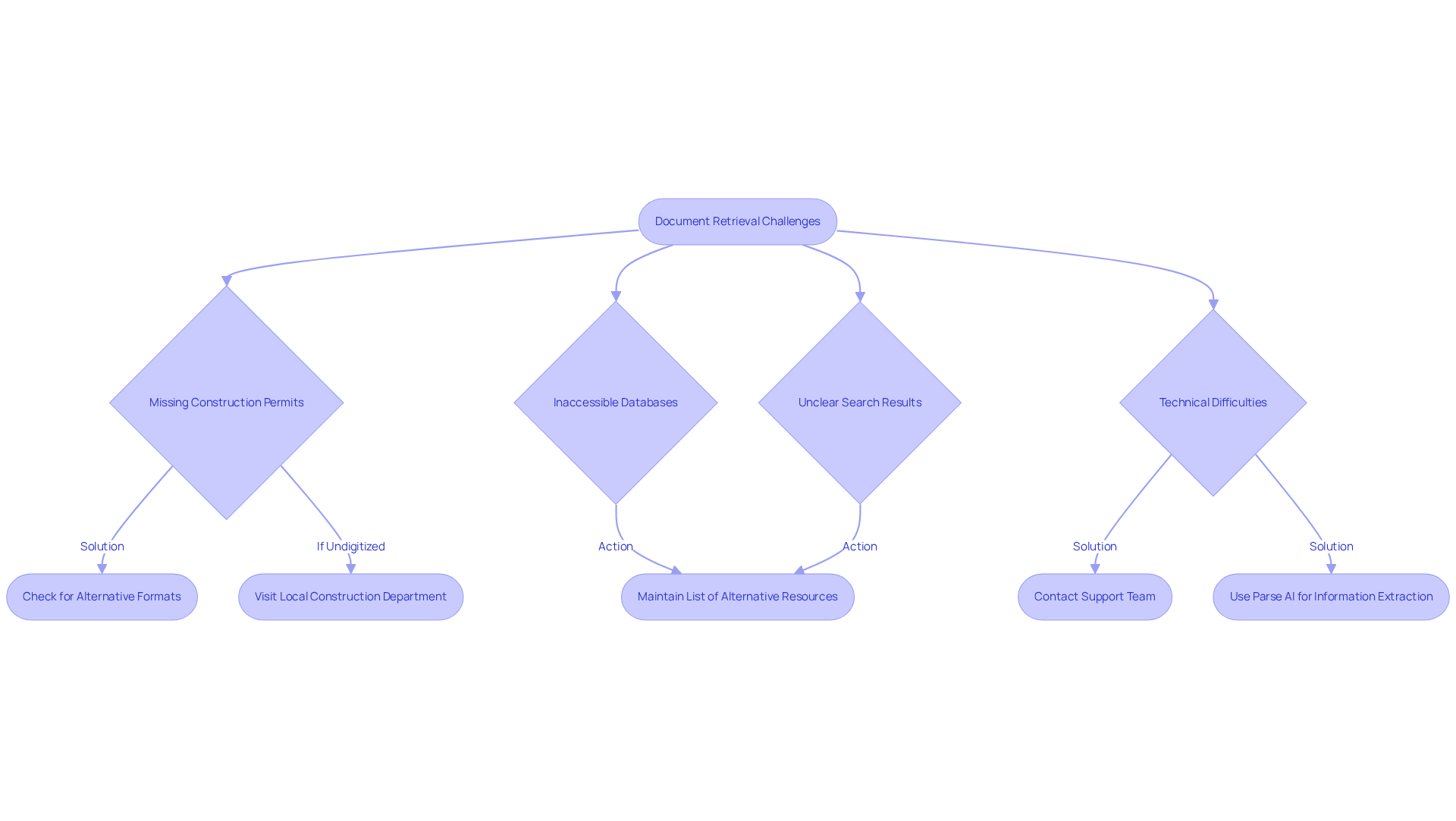Overview
This article underscores the essential steps title researchers must undertake to uncover building permit history, highlighting its critical role in understanding property compliance and marketability. It delineates effective methods for accessing online records, analyzing the retrieved data, and troubleshooting common retrieval issues. By doing so, it equips researchers with the vital tools necessary to enhance their reports and facilitate informed real estate decisions.
Introduction
Understanding the history of building permits is crucial for professionals engaged in real estate, urban planning, or title research. These permits offer a comprehensive overview of construction, renovation, and demolition activities, providing essential insights into a property's adherence to local regulations and its overall market value. However, the intricacies of building permit history can be overwhelming, prompting concerns about how to effectively access and analyze this vital information.
What strategies can title researchers employ to uncover the necessary data and facilitate informed decision-making in a rapidly evolving real estate landscape?
Understand Building Permit History
To understand building permit history, one must learn how to find building permit history, which encompasses the documentation of all permits issued for construction, renovation, or demolition activities associated with a site. These records are vital for understanding the development timeline of the site and ensuring compliance with local building codes and regulations. Familiarity with the various types of permits—such as residential, commercial, and special use permits—is essential, as each type carries unique implications for value and legality. For instance, properties with unauthorized modifications may face significant devaluation, as potential buyers often perceive them as risky investments. Mike Breed asserts, "Understanding local development trends and making informed real estate decisions requires access to reliable and comprehensive data." Indeed, properties lacking the necessary approvals can incur costly fines and complications in future transactions.
Understanding how to find building permit history not only aids in accurate research but also empowers title researchers to provide valuable insights to clients. Urban planners, for example, leverage building permit data to track , fostering sustainable growth that aligns with community objectives. This data also assists real estate investors in pinpointing emerging markets and assessing potential investment opportunities, as properties with a history of permitted work are typically viewed more favorably in the market. By effectively analyzing these documents, title researchers can enhance their reports and facilitate informed decision-making for stakeholders. Furthermore, with Massachusetts home sales surging 24.3 percent year-over-year in July and the average home sale price reaching $687K in June, the importance of construction authorization data in evaluating real estate value is more critical than ever.

Access Online Building Records
To access online building records, it is crucial to begin by understanding how to find building permit history through the local government or municipal website that oversees building approvals. Most cities provide dedicated portals that show how to find building permit history by entering the property address, parcel number, or owner name. For example, the City of Berkeley provides a platform known as Building Eye, enabling users to look up approvals granted since 1993. Utilize filters effectively to and narrow down your search results. Furthermore, familiarize yourself with other nearby resources, such as the Accela Citizen Access portal, which offers extensive access to construction documents across various jurisdictions.
As of June 2025, construction permits in the U.S. decreased by 0.1% to a seasonally adjusted annualized rate of 1.393 million, underscoring the importance of staying informed on local permit trends. Always ensure you have the correct address and any relevant details when considering how to find building permit history to streamline your search. Be mindful of the state-governed fee for copies of documents, which is $1.00 per page, and the fee for searching archived materials, which is $8.00 per hour. Remember to access these government websites securely, indicated by a lock symbol or 'https://' in the URL. As Public Records Officer Cecilia Wilson states, "If there is a way we can assist you with a particular request, please let us know.

Analyze Retrieved Building Records
Following the retrieval of building records, the subsequent step involves a comprehensive analysis of the information. Key aspects to examine include:
- The categories of licenses granted
- Their issuance dates
- Any inspections conducted
Discrepancies hold particular significance; for example, authorizations that were granted but not finalized or inspections that failed may indicate potential concerns. Recent data reveals that approximately 30% of real estate has undergone multiple renovations, suggesting ongoing issues that could impact ownership or value. As one title researcher noted, "Common discrepancies in building permits often arise from incomplete documentation or miscommunication during the permitting process."
This analysis should culminate in a detailed report that outlines the property's compliance with local regulations and highlights any that may affect its marketability. Furthermore, employing tools such as Parse AI can streamline this analysis, enabling title researchers to efficiently extract and evaluate essential data from extensive databases.

Troubleshoot Common Issues in Record Retrieval
The document retrieval process is critical for title researchers, who often encounter significant challenges such as missing construction permits, inaccessible databases, and unclear search results. To address these issues, first check for in alternative formats or through various agencies. It is essential to note that nearly 30% of older property documentation may remain undigitized, necessitating a visit to the local construction department for access. As industry experts frequently emphasize, 'Retrieving construction files can be a challenging endeavor, particularly when managing obsolete systems and insufficient information.' Should you encounter technical difficulties with online portals, reaching out to the support team of the respective website can provide the necessary assistance.
Furthermore, it is advisable to maintain a list of alternative resources, such as:
- Local archives
- Libraries
where historical building records may be stored. Additionally, tools like Parse AI can significantly streamline this process by quickly extracting essential information from title documents, thereby enhancing overall efficiency. By adopting a proactive and resourceful approach, you can effectively troubleshoot these challenges, ensuring a comprehensive and successful title research process.

Conclusion
Understanding how to find building permit history is crucial for title researchers, real estate investors, and urban planners alike. This knowledge not only aids in compliance with local regulations but also enhances the ability to make informed decisions regarding property investments. By navigating the complexities of building permits, researchers can uncover valuable insights that contribute to the overall assessment of a property's value and marketability.
The article outlines essential steps for accessing and analyzing building permit records. Key points include:
- Recognizing the different types of permits and their implications
- Utilizing online resources effectively
- Conducting thorough analyses of retrieved documents
Furthermore, it emphasizes the importance of troubleshooting common issues that arise during the record retrieval process, ensuring that researchers can obtain comprehensive and accurate information.
In conclusion, the significance of building permit history cannot be overstated. As the real estate market continues to evolve, staying informed about construction trends and compliance issues is vital. By mastering the steps to find building permit history and overcoming retrieval challenges, title researchers can provide invaluable support to their clients, ultimately fostering informed decision-making in real estate transactions. Embracing this knowledge will not only enhance professional expertise but also contribute to the sustainable growth of communities.
Frequently Asked Questions
What is building permit history?
Building permit history refers to the documentation of all permits issued for construction, renovation, or demolition activities associated with a site. It is essential for understanding the development timeline and ensuring compliance with local building codes and regulations.
Why is it important to understand building permit history?
Understanding building permit history is vital for assessing the legality and value of a property. Unauthorized modifications can lead to significant devaluation, as potential buyers may view such properties as risky investments.
What types of permits are included in building permit history?
Building permit history includes various types of permits such as residential, commercial, and special use permits, each carrying unique implications for value and legality.
How can building permit history aid in real estate decisions?
Access to reliable building permit data allows real estate investors to identify emerging markets and assess potential investment opportunities, as properties with a history of permitted work are generally viewed more favorably.
Who benefits from understanding building permit history?
Title researchers, urban planners, and real estate investors benefit from understanding building permit history. Title researchers can provide valuable insights, urban planners can track construction trends, and investors can make informed decisions regarding property value and investment opportunities.
How does building permit data influence market trends?
Building permit data helps urban planners foster sustainable growth aligned with community objectives and assists real estate investors in pinpointing emerging markets, making it crucial for evaluating real estate value, especially in fluctuating markets.
What recent trends highlight the importance of building permit data?
The surge in Massachusetts home sales by 24.3 percent year-over-year in July, with an average home sale price reaching $687K in June, underscores the critical role of construction authorization data in evaluating real estate value.




